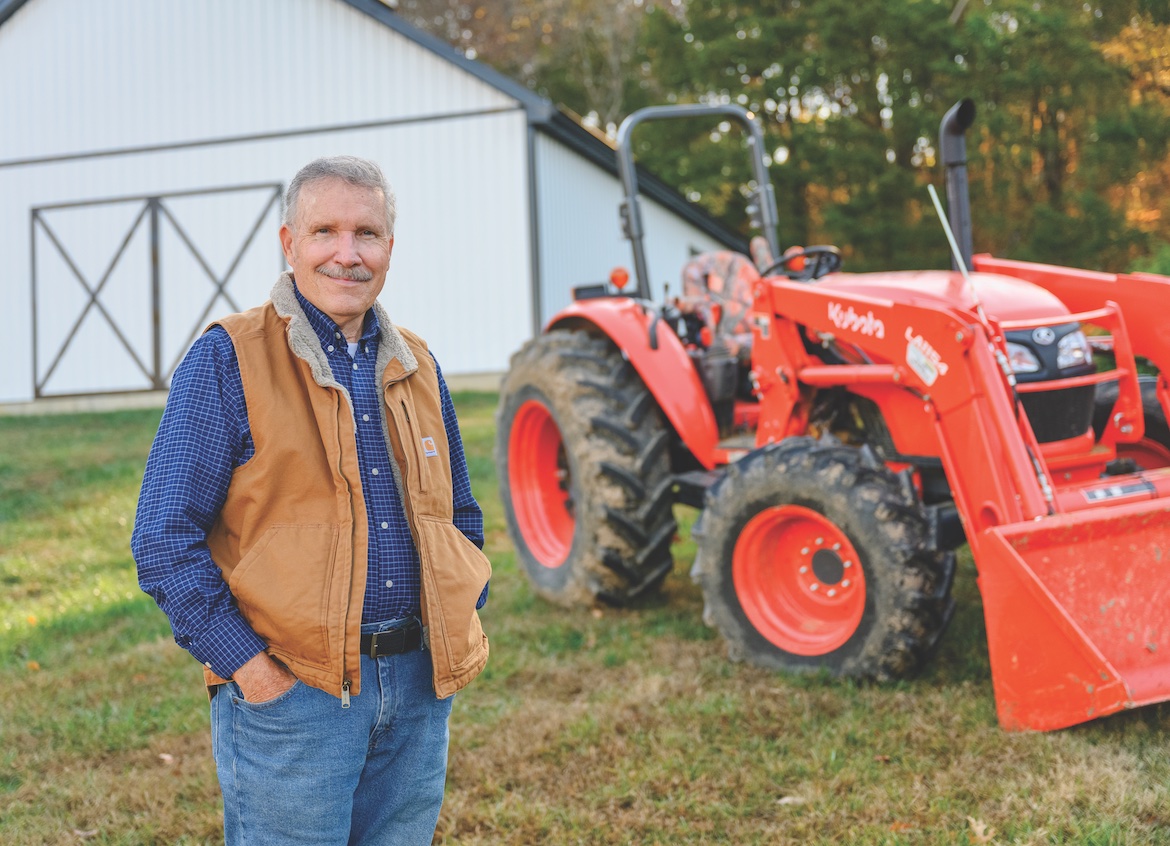
11 minute read
Built to Last

Management Professor Patrick Geho leads a team that builds Tennessee's economy
by Drew Ruble
During the nearly three decades Patrick Geho has worked with the statewide Tennessee Small Business Development Center (TSBDC) program, he has seen it help countless individuals start or expand their businesses.
In his years of service with the TSBDC office at MTSU, Geho has secured more than $40 million in state, federal, and in-kind funds under various economic development contracts.
In this program year alone, the center just landed a U.S. Small Business Administration grant of almost $2.7 million to deliver business development and training services through the statewide TSBDC network. In addition, the lead center has applied for almost $3.9 million in U.S. Department of Treasury State Small Business Credit Initiative funding.
“This would expand business consulting and training opportunities in underserved communities lacking access to capital and build financing ecosystems that support entrepreneurs and small businesses,” said Geho, a Department of Management professor who started at MTSU as a TSBDC service director in 1995 and has been lead center director since 2006.
There are many success stories stemming from the TSBDC’s work, which continues to benefit businesses across the state.
For instance, when the COVID-19 pandemic struck, the Riverfront Seafood Company restaurant in Kingsport suddenly had no patrons. Established in 1991, Riverfront’s slogan is “attitude is everything.” With help and timely guidance from their local TSBDC, Riverfront’s ownership was able to obtain a Paycheck Protection Program (PPP) loan, resume operations, and retain all its staff. Business is booming again.
Or how about when family health issues required Knoxville resident Lynette Casazza’s household to go gluten-free— Casazza quickly (and regrettably) discovered there was no provider of gluten-free baked goods in her area. She responded with more than motherly concern; she responded with an entrepreneurial flair. Casazza launched her own bakery, Mama C’s Gluten-Free Goodies, making the leap into small business ownership with the mentorship of her local TSBDC.

Patrick Geho, Management faculty and Tennessee Small Business Development Center executive director, at his Smith County farm
Photo by J. Intintoli
Locally, family-owned Duggin Construction showcases the long-term work of the TSBDC to help a client grow and sustain during economic bursts and booms. Duggin's chief financial officer, Misael Tovar, has been meeting with the TSBDC since 2013. The 20-year-old company, which provides services in land clearing, underground utility installation, and grading, has received consulting on topics such as business insurance, debt financing and consolidation, and financial analysis. The TSBDC also provided Duggin information on the PPP and Economic Injury Disaster Loan programs during the pandemic and most recently advised the company on employee retention credits. As the TSBDC has walked alongside Duggin, company sales have grown by an average of 31% each year over the last nine years, resulting in more than 100 new jobs and over $10 million in locally infused capital.
But it’s not just traditionally “small” businesses like these that the TSBDC has helped launch, grow, or just stay afloat. Contrary to what people might think, Geho said a small business is defined by the U.S. Small Business Administration (SBA) as a company with 500 or fewer employees. However, the TSBDC has provided assistance to much larger firms when the assistance requested does not involve seeking SBA loan guarantees.
The TSBDC also works with state, county, city, and quasigovernmental agencies on a wide range of economic and community development projects. In recent years the TSBDC has worked closely with entities like the Gibson Rural Electric Cooperative, owned by its 39,000 members across eight west Tennessee and four west Kentucky counties. When the cooperative determined to construct a highspeed broadband infrastructure for its service area but needed technical help with the application process for a U.S. Department of Agriculture Reconnect Loan, it smartly reached out to its local TSBDC office. The result? The cooperative landed more than $31 million for the project.

Geho and associate director Kayla Miller at the Tennessee Small Business Development Center office
In another example, the MTSU service center successfully assisted rural Smith County in applying for a certificate of public purpose and necessity to borrow funds to develop an industrial park.
According to Geho, there are thousands more stories just like these sprinkled across the organization’s nearly 40 years of service to the state.
A Partner in Business
Created by Congress in 1980 and adopted by Tennessee in 1984, the Small Business Development Center program combines the resources of higher education, government, and the private sector to support the development of small businesses. In 2004, MTSU President Sidney A. McPhee was successful in relocating the TSBDC lead center from Nashville to MTSU, allowing collaboration with faculty and creating experiential learning for students through paid internships in the community through the lead center.
With the lead center headquartered in Murfreesboro, the TSBDC network consists of 14 service centers (including at MTSU) and two affiliate offices across the state. Each service center is staffed by consultants who provide no-cost virtual and in-person business consulting, training, and resources to help businesses start, grow, and sustain. After all, not everyone who starts a business went to business school.
Center staff can assist in business and financial planning, marketing and sales strategies, social media and website analysis, government contracting, international trade, cybersecurity, and numerous other areas. The centers also conduct market research as well as competitive and financial analyses at no cost to the client. And staff help companies with preparing to go before a lender and getting access to capital. TSBDC’s assistance and training resources represent a gold mine of opportunities for new and growing businesses.
“We’re all about reaching out to small businesses,” Geho said. “Helping somebody grow a company from 30 employees to 100 employees may not sound like a big deal to some people, but if it’s happening in your community, 70 more jobs is very significant.”
Geho, who served as a primary architect of MTSU’s new Business Innovation and Entrepreneurship major (and who teaches its capstone class), knows of what he speaks. That’s because he has lived what he now does.

Prior to coming to MTSU, Geho was founder and co-owner of Consolidated Investors Inc., which developed commercial and industrial properties. The company later ventured into manufacturing, incorporating as SCIC Inc., an automotive drivetrain component subassemblies metal coatings manufacturing plant serving Dana Corp., Chrysler, General Motors, Mercedes, Nissan, and Toyota.
As CEO, he grew the plant population to more than 130 employees. As an entrepreneur, Geho was recognized by the White House in 1995. He also serves as an officer on several statutory economic development boards.
Under Geho’s leadership, the TSBDC has expanded in both size and scope. Four new centers have opened, and the network has grown to almost 50 staff.
SBDC programs nationwide can tell similar success stories of growing the American economy through their many assistance programs.
No Man Is An Island
A leader highly regarded by his colleagues statewide, Geho is reluctant to take too much of the credit for TSBDC’s success.
“I’m all about bringing people that are smarter than I am,” Geho said. “It’s all about continuous improvement. I never pretend to be the sharpest knife in the drawer, and I even tell my students that they are going to say something that’s going to spark an idea that I never really thought of before. If you pay attention, you will always learn something new.”
A sterling example of Geho’s team approach and his instinct to develop future leaders is the story of his right-hand colleague at TSBDC, Kayla Miller.
Miller began her career at a small business in Birmingham, Alabama, and was integral in the rapid growth of the company from 70 employees to 150. This experience allowed her to learn everything she could about HR, payroll, accounting, and business development.
Miller and her husband eventually moved to Memphis. Both got jobs at St. Jude Children’s Research Hospital—Miller as a compensation analyst in HR and later as an administrative manager in the outpatient nursing division.
“I had learned how small business worked, and now I got to see how a large organization functioned, while also being introduced to the idea of working for a mission—not just a business,” she said.
After moving to Murfreesboro, with a newborn baby to care for, Miller started doing part-time business counseling at the TSBDC. She later went full time in the service center at MTSU and now is associate director at the lead center.
Miller’s timeline at TSBDC placed her smack dab at the center of one of the most disruptive events in the history of small business—the COVID-19 pandemic.
“It was terribly difficult,” Miller said. “You almost have like a PTSD-type reaction when you talk about it. It was a desperate feeling to listen to your clients who were confused and concerned with the possibility of losing their life savings, having to let employees go, and talking about what this was going to do to their community, friends, and neighbors.
“Just considering the options at hand could be excruciating. It was a time of very, very difficult conversations filled with lots and lots of questions like ‘Is taking a PPP loan even the right thing for my business?’ ”
In short order, though, the TSBDC found its footing and served a key role in guiding clients through perilous times.
“Our staff pivoted and started doing online webinars and also were able to provide people with real-time updates on the federal response. We created additional stakeholder newsletters. We were emailing daily to our chambers,” she said. “Our office was actually the central hub for information . . . just doing the best we could to get people through.”

Geho said COVID-related consulting continues to this day. For instance, businesses that took loans and had payments deferred are having payments coming due, and many people just forgot about it.
“Clients are getting due dates in the middle of inflationary times,” Geho said. “They are turning back to us as consultants to help them deal with it.”
Miller has also brought in a company to redevelop the TSBDC’s financial tools, freeing up more time for center directors to consult and innovate. She also was the driving force behind the TSBDC’s website enhancement project and the new Knowledge and Training Portal, featuring 120-plus short business videos free to the public.
Staff involvement in committees and in projects to serve the state is a further testament to the heart of the TSBDC.
“The quality of the people working in the lead center’s Murfreesboro office and across the state in TSBDC centers is what really makes the program work,” Geho said. “The people who work here are highly skilled, and they care about helping people.”
Down on the Farm
Geho clearly has the support he needs to do the work of the TSBDC. That’s not to say he’s sitting on his laurels. It’s simply not in his DNA to either sit still or stop building. His success both as an entrepreneur and as leader of the TSBDC is proof of that.
Geho’s work ethic extends to service with his community’s industrial development board, chamber of commerce, regional development district, and the education foundation he chartered. When he is not volunteering, he is spending time on his farm.
“I just like being together with my wife and grandkids and doing things around the farm,” he said. “I’m a lousy golfer, don’t play tennis, not much luck fishing. I’d much rather cut hay, fix fence lines, take care of the horses, or work on equipment.”
Geho said the picture he paints of himself in his free time may not seem very exciting to some. “I’m what my wife calls an easy keeper,” he joked.










